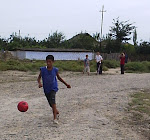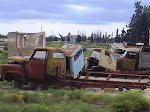6/30
This is where my head is, in my sleep, but also, usually, no matter where I am:
I thought it was Chicago. I took a left and walked for two blocks, what seemed like several hours, when I came to sign that read, “San Francisco Eatery,” and I was confused. The botanical courtyard stood in the middle of a two-lane round-about. When I sat down in the middle of it to rest, because my eyes were hazy and thoughts were grey too, my head dropped to two cold, bare feet on the dirty pavement.
When I saw these nice black, floral, ankle-high pumps under a bench I slipped them on. Soon enough a woman yelled, “Excuse me! Those are my shoes!”
“Oh, I’m sorry, I thought they were mine,” because I thought they really were.
“How can you steal people’s things?”
“I didn’t know. I didn’t mean to. I’m just very confused and don’t know where I am.”
“Did you just get back from Peace Corps?”
“Yes, I did!”
“I understand, I was a Peace Corps Volunteer too! I didn’t know where I was for a long time when I got back, things will get better, I promise!”
7/10
“Sasha, meet me at school. You need to help with computers.” This is how they speak here, in commands. Obediently, I go.
The girl who calls, Pervan, is not at school. I walk home. Turn on the fan, lay on my bed. The fan shuts off with the 8 o’clock electricity shortage. She calls again. “Sasha, where are you? I told you to meet me at school to help with computers.”
I go again. She is not there. I walk home. Lay on my bed in the corner of my swelteringly hot room.
“Sasha, where did you go? Why aren’t you here? You need to help with computers.”
“Are you going to be there when I get there?”
“Yes, of course.” This is the speed of development.
She is there, with a young girl, a smile like the swooping shape of a long bridge.
“Good morning, Sasha, how are you?”
“Fine, thanks. Where are we going?”
“There’s a new computer center in the middle of the village.”
“Really?”
It’s a small thing, an old white shack with blue trim, where diagrams for a mechanics course are hung in the halls. Dusty, crumpled, written in Cyrillic, they haven’t been touched in years.
There are three rooms here, and each house one or two computers where students type with one right index finger. The speed is like watching a beginner musician grapple with the
“What is this?”
Turial smiles. I met Turial at a wedding a couple weeks before when he modestly shook my hand and offered a curtsey. He is tall, and thin, and smiles ardently when speaking of possibility.
“They’re from the town center, from Baku, actually. The government wants to teach teachers to use computers.”
Indeed they do, but it’s a wonder they’ve provided my little village with HP Laptops to start.
“Other villages and the town center have them, too.”
“Well this is great. Are you teaching programs?”
“Yes. Here are the teachers.” He hands me a list of a couple familiar names and some he says are 30 minutes into the town center.
“Are the courses free?”
“No, this is not your class, Sasha! They are 90 manats.”
“Oh, that’s a lot.”
“No, for three months. One month is 30 manats.”
“When do they come?”
“Once a week.” Expensive.
“Can I teach?”
“Yes, we want you to help with English. We know Russian, but we need to know words in English.”
Through a Turkish translator online I found a Turkish to English 1200-page dictionary of computer terms.
Two days later I brought it on a flash with an Azerbaijani Foreign Leadership Exchange (FLEX) Program guide for study abroad students.
“Oh, this is very good, Sasha. Thanks. Can you teach an English conversation club here?”
“Sure. When do you want me to come?”
“3 o’clock, Monday, Tuesday and Wednesday.” It is noon on Wednesday, so at 3 o’clock I slap on sun block and hike back to the computer center under the tress, adjacent to the open field where rusted, tireless trucks lay vacant in the distance. No one is there.
Pervan calls me at 4 o’clock and I’ve already slipped into short shorts and flipped the fan to the highest level. “Maybe next week,” I tell her.
7/14 ONE MONTH TILL FLIGHT TO SFO
7/15
Lankaran is two hours north of Iran, and is a city known for its forest and waterfalls just out of the town center. I traveled to Lankaran this past weekend to give a presentation entitled “The Ins and Outs of Interactive Visual Aids” to the Azerbaijan English Teacher’s Association (AzETA).
On Sunday morning five teachers and three PCVs watched the PowerPoint presentation on how to use local products to construct aids you can touch, stick, turn and sometimes flip. I brought a human body that we constructed using a big, white sheet of paper, markers, cardboard, plastic wrap, hard wood and Velcro. Using few artistic skills, we crafted a human body and stuck Velcro to it. Using construction paper we cut out clothes for the body and glued each article of clothing to a piece of cardboard and then Velcro. The clothes rip on and off the body for winter, summer, fall, and spring apparel.
Other aids were drawings of verbs on flashcards that match up words from a list, clocks cut from construction paper and fastened with brads, and a mixed fairy tale where you arrange the pictures and sentences accordingly.
Teachers and Volunteers were elated. Through short exercises with the visual aids both recognized the value of physically interacting with the subject, and that the project at hand is cheap and very attainable.
So much of what we do as students in the U.S. is interactive: Speeches, science projects, art class. I think that we need more of it in our classrooms, more entrepreneurial and service-learning projects, to connect the world to students and visa versa.
That said, so much of what they do here is staunch memorization with no critical assessment or interaction with the subject being learned.
Providing students with interactive visual aids is so far from where we are in the U.S., but so close to where Azerbaijani educators and students need to be.
To introduce not just a method of teaching but a method of thinking and being is profound; that’s what this is: instead of simply thinking about the subject, interact with it, play with it, and question it. And when they recognize, “Yes, we can do this too,” oh, the profundity of it is overwhelmingly cheerful.
I’m really going to miss what I do here. It is by far the most rewarding work I’ve ever had, and I will be fortunate if I can come close to this feeling and stimulation in the way of a career.
Wednesday, July 15, 2009
Subscribe to:
Comments (Atom)

















































